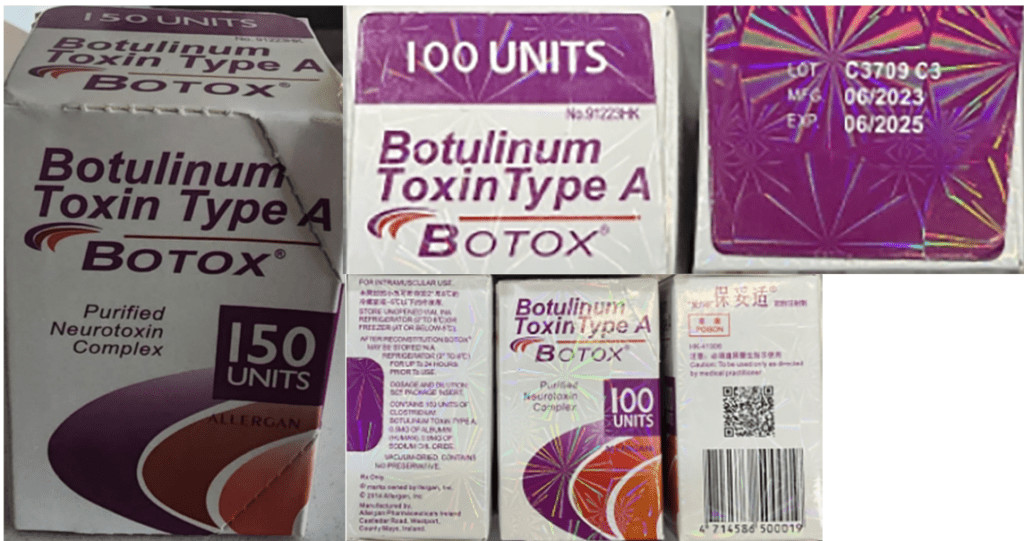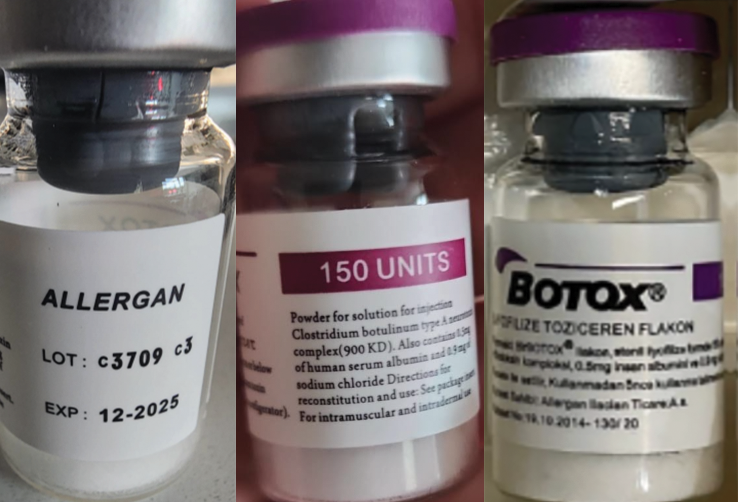FDA alert: Counterfeit version of Botox found in multiple states
This is a reprint of an FDA Alert.
Counterfeit Version of Botox Found in Multiple States
[4-16-2024] FDA is alerting health care professionals and consumers that unsafe counterfeit versions of Botox (botulinum toxin) have been found in multiple states and administered to consumers for cosmetic purposes.
FDA is aware of adverse events, including hospitalizations, linked to the counterfeit Botox. Symptoms included blurred or double vision, difficulty swallowing, dry mouth, constipation, incontinence, shortness of breath, weakness and difficulty lifting one’s head following injection of these products. These symptoms are similar to those seen when botulinum toxin spreads to other parts of the body.
FDA takes reports of counterfeit products seriously and is working closely with the Centers for Disease Control and Prevention (CDC), state health departments and manufacturers to help protect the nation’s drug supply. FDA’s investigation is ongoing, and the agency is currently working with AbbVie (the Botox manufacturer) to identify, investigate and remove suspected counterfeit Botox products found in the U.S.
These incidents have occurred when counterfeit Botox is injected by licensed and unlicensed individuals and/or in non-medical or unlicensed settings. The products appear to have been purchased from unlicensed sources. Medications purchased from unlicensed sources may be misbranded, adulterated, counterfeit, contaminated, improperly stored and transported, ineffective and/or unsafe.
Information for Health Care Professionals
- Purchasing and administering counterfeit products puts your patients at risk.
- Check the product for any signs of counterfeiting before using it.
- Federal law requires that all health care providers who dispense or administer prescription drugs purchase those products only from authorized sources.
- Visit FDA’s website for information about how to safely purchase prescription drugs for your patients: Know Your Source: Protecting Patients from Unsafe Drugs.
Information for Consumers
- If you are experiencing any of the symptoms listed above, following an injection of botulinum toxin products, contact a health care professional or go to the emergency room.
- Confirm with your health care professional that you are receiving a product from an authorized source.
- Ask your health care professional if they are licensed and trained to administer the product.
Signs of Counterfeit Versions of Botox
There are some similarities between the counterfeit Botox products and the FDA-approved Botox.
AbbVie manufactures the authentic Botox products in 50-, 100- and 200-unit dose forms. The product descriptions on the outer cartons are either “BOTOX® COSMETIC / onabotulinumtoxinA / for Injection” or “OnabotulinumtoxinA / BOTOX® / for injection.” The manufacturer identified on the outer carton is either “Allergan Aesthetics / An AbbVie Company” or “abbvie.” FDA-approved Botox displays the active ingredient as “OnabotulinumtoxinA” on the outer carton and vial.
Currently, there is no indication that the reported events were linked to AbbVie’s FDA-approved Botox, and the genuine product should be considered safe and effective for its intended and approved uses.
The counterfeit product includes counterfeiting of the outer carton and vial. The counterfeit product may be identified by one or more of the following:
- the outer carton and vial contain lot number C3709C3
- the outer carton displays the active ingredient as “Botulinum Toxin Type A” instead of “OnabotulinumtoxinA”
- the outer carton and vial indicates 150-unit doses, which is not a unit made by AbbVie or Allergan
- the outer carton contains language that is not English
Counterfeit Package
Counterfeit Vial
Consumers should report suspected counterfeit Botox products to FDA at 800-551-3989, or through www.accessdata.fda.gov/scripts/email/oc/oci/contact.cfm.
Health care professionals and consumers should report adverse events related to the use of any medications, including suspected counterfeit medications to FDA's MedWatch Safety Information and Adverse Event Reporting Program:
- Complete and submit the report online at MedWatch Online Voluntary Reporting Form, or
- Download and complete the form, then submit it via fax at 1-800-FDA-0178.

